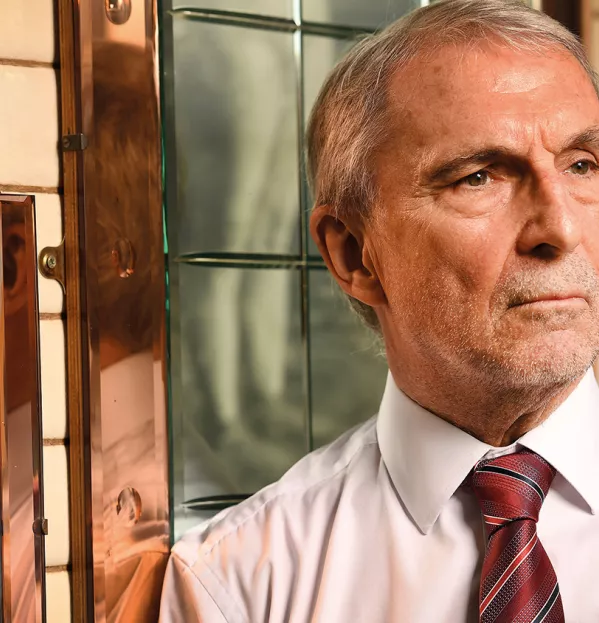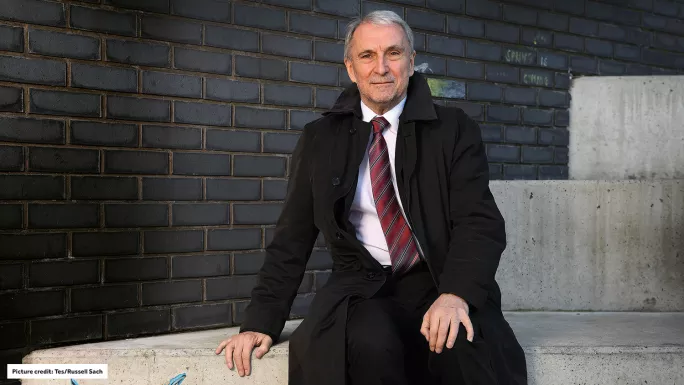‘Teachers have to be in each other’s classrooms to see what’s going on. Schools are organised to prevent that’

As faint praise goes, Mel Ainscow’s summary of the government’s social mobility action plan is pretty damning.
“I’m sure it’s well-intentioned,” the University of Manchester professor of education says. “I’ve no doubt that people genuinely want to address that challenge.”
He pauses. “But it does seem to me that current policy is a mix of positives and negatives. The good, the bad and the ugly, really.”
Ainscow previously held the post of chief adviser for the Greater Manchester Challenge, a £50 million Labour initiative to improve educational outcomes for pupils across the region, inspired by the London Challenge scheme.
He has since been involved with similar schemes around the country. And, at the end of last year, he was appointed chair of a new Greater Manchester education and employability board, looking at educational attainment throughout the region.
Over lunch, he expounds on the problem with the government’s social mobility strategy, which aims to close the gap between disadvantaged children and their classmates through specific strategies, such as expanding poorer pupils’ vocabulary. In essence, Ainscow says, politicians are attempting to provide a top-down, catch-all solution. And that is not how schools work best.
“It seems to me that you want teachers who feel free to innovate and experiment and find ways of reaching the children we’re not reaching,” he says. “Actually, what we’re getting at the moment is a search for a one-size-fits-all.”
Hands-on approach
Securing government support - including much-needed cash - often relies on schools’ willingness to accept what Ainscow refers to as “what-works strategies”.
“There’s an awful lot of imposition on schools,” he says. “The money that’s now being made available from the government to support education improvement is very much contingent on dancing to the tune of the government. There are certain things that you have to be seen to be doing.”
Ainscow’s interest in social mobility stems from his own childhood. He was brought up in inner-city Manchester. His father was a printer and his family was not wealthy. Although his parents were committed to education, they had little practical experience of it. After Ainscow sat the 11-plus, he was allocated a place at a technical high school. (“To this day, I wouldn’t know how to mend a plug,” he says.)
He later trained as an art teacher - “Not a very good art teacher” - before working in special educational needs: “Running through my story is a strand based on that personal experience of thinking, ‘There must be a better way of helping every child to find their place, to find their aptitude and what they want to do.’”
After being appointed as a headteacher, he went on to work for the local authority. And, although he has since moved into academia, he has deliberately focused on the types of research that necessitate hands-on work with schools and networks of schools.
This, he says, requires a careful balancing act: “A research stance - somebody that’s always enquiring, asking questions, using evidence to raise those questions - is by its nature a disturbance. You’re there to disturb: to make people stop and think. We’d deliberately position ourselves as participants, collaborators, but critical friends.
“That’s very easy to explain, but it’s actually quite difficult to do. Because, if you go too far to one side, you become a collaborator in the worst sense. If you go too far to the other side, you get thrown out. But clearly, I make mistakes. You raise some issue, and you realise you’ve not been invited to the next meeting.”
Many academic researchers are dismissive of the notion that teachers, too, can work as researchers, conducting trials of their own. Ainscow, however, disagrees. “It depends on your definition of research, really. For me, teaching is about research,” he says. “You might not want to call it that, but every lesson is different and every time you’ve taught this lesson, it’s going to be different.
“What very skilful teachers are doing all the time - which I take to be a kind of practitioner research - is that they’re collecting information by watching and listening and thinking on their feet, and making adjustments.”
Obviously, this is not research in its most commonly understood form. But the lack of a randomised-control element does not make it any less valid, Ainscow believes. “It’s a much more sophisticated kind of research,” he argues. “It’s research that is about changing practice now, and finding something that will work with those children now.”
And that, he says, is why teachers are so often exhausted by the start of the school holidays. “People say: ‘You’re exhausted? You have a short day, you have long holidays, you’re surrounded by all these happy, smiley children, and you’re exhausted?’ Well, unless you’ve been a teacher, it’s difficult to explain.
“By its very nature, teaching is about enquiry. It’s about learning what to do in unpredictable circumstances. Every lesson is unpredictable. It’s physically tiring. It’s emotionally tiring. And it’s intellectually tiring.”

Crucially, he believes that dictating to teachers what works in the classroom denies them the professional autonomy to determine what works best in their own schools or communities. “It’s leading, I’m afraid, to a situation where teachers are increasingly seen as people who deliver something, rather than being professional people who make judgements and find ways of reaching the people who we need to reach,” says Ainscow.
“If we try to reach the children we’re not reaching at the moment by doing more of the same, my feeling is it won’t work.
“We have to trust teachers more; we have to leave more space. And they must be in a position to innovate. I think the current system isn’t allowing that.
“Once you start to take the professionalism out of the profession, then what’s left?”
For this reason, he singles out for particular criticism the Education Endowment Foundation (EEF), which is attempting to establish, through randomised-control trials, what does and does not work in the classroom. “Actually, what works in one place won’t work in others,” he says. “I’m not against that kind of research, and it can be useful. But where - as is currently the case - [the EEF is] being seen as providing the answers, I think it’s unhelpful. Even worse, it’s dangerous.”
He expands on this danger. The EEF has established a list of preferred providers: suppliers of interventions that have proven effective in EEF trials. He fears that this will narrow schools’ options. Then there is funding for schools, which has become contingent on using particular providers. For example, the government’s Teaching and Leadership Innovation Fund is linked to eight providers of professional development programmes, which includes EdisonLearning, Tom Bennett Training and Ruth Miskin Training.
“The various funding streams - it’s quite a lot of money - list the preferred providers,” Ainscow says. “So you have to go to these providers, who will tell you how to teach.
“I want a school where teachers are creative, where they’re responsive, where they get to know their children, and where the staff help one another to find the best ways of teaching those children in that context.”
‘Horizontal accountability’
He is no radical, looking to do away with national accountability. But, he says, this needs to be complemented by “horizontal accountability”: schools learning from schools and teachers learning from teachers.
“You look at your own context,” he says. “You determine what the challenges are and you say, ‘Right. What can we do here to address those challenges?’ Now, what’s coming from Westminster is a lot of, ‘Right. Here is the solution. We’re going to send it out. We have favoured people who are going to come and deliver the answers.’”
In the old days, local authorities would be responsible for making sure that schools worked at a local level. The era of the local authority is over, he acknowledges. But perhaps there is room for a new, regenerated version to emerge. Obviously, schools come together to form multi-academy trusts. But, he adds, smaller schools, and those most at risk, can be left behind by such systems.
“All my experiences have told me that schools in partnerships and networks is a vital part of creating a more equitable education system, but it won’t happen by chance. It needs orchestrating.”
“Schools that make progress, they invest in the learning of teachers in the knowledge that that will pay off in the learning of children. So time has to be made. Space.”
And so, he returns to the importance of trusting those tasked with teaching: “Teachers have to be in each other’s classrooms to see what’s going on. Schools are organised to prevent that: teachers are in classrooms with the door closed; the timetable is full. All they know is what goes on in their own classroom.
“Now, the schools that make progress, they deliberately, strategically stop that isolation. They’re creating an environment of innovation.”
You need a Tes subscription to read this article
Subscribe now to read this article and get other subscriber-only content:
- Unlimited access to all Tes magazine content
- Exclusive subscriber-only stories
- Award-winning email newsletters
Already a subscriber? Log in
You need a subscription to read this article
Subscribe now to read this article and get other subscriber-only content, including:
- Unlimited access to all Tes magazine content
- Exclusive subscriber-only stories
- Award-winning email newsletters